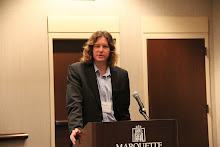Here is a quotation from Wittgenstein's Remarks on the Foundations of Mathematics which presents a nice picture of nominalism.
"...[Practice] surrounded the word with a whole lot of pictures (visual and others) of which one or another comes up when we hear and speak the word. (And if we are supposed to give an account of what the 'meaning' of the word is, we first pull out one from this mass of pictures - and then reject it again as non-essential when we see that now this, now that, picture presents itself, and sometimes none at all.)"
I am becoming more and more interested in nominalism recently, and have faced some interesting resistance when arguing against some of Husserl's claims from a nominalist position. I think in the near future I will be revisiting Berkley and Spinoza, and perhaps even wading into the medievals, in order to focus in on this issue. Specifically I am interested in what nominalism looks like when its mentalistic elements are taken away. Imagine a nominalism embodied in lived practice without mental images or pictures. I feel that some of my interpretations of Heidegger's work push in this direction. Both Wittgenstein and Althusser are also helpful on this point.
Subscribe to:
Post Comments (Atom)


No comments:
Post a Comment